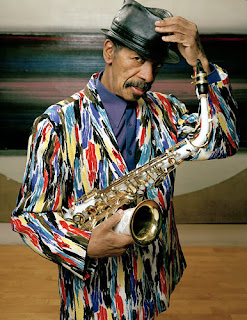
In recognition of the 78th birthday of jazz pioneer Ornette Coleman, the following excerpt from his biography at AllAboutjazz.com
Born in a largely segregated Fort Worth, Texas on March 9, 1930, Coleman's father died when he was seven. His seamstress mother worked hard to buy Coleman his first saxophone when he was 14 years old. Teaching himself sight-reading from a how-to piano book, Coleman absorbed the instrument and began playing with local rhythm and blues bands.
In his search for a sound that expressed reality as he perceived it, Coleman knew he was not alone. The competitive cutting sessions that denoted 'bebop' were all about self-expression in the highest form. “I could play and sound like Charlie Parker note-for-note, but I was only playing it from method. So I tried to figure out where to go from there,” Coleman said.
Los Angeles proved to be the laboratory for what came to be called free jazz. There began to gather around Ornette a core of players who would figure largely in his life: a lanky teenage trumpeter, Don Cherry and a cherubic double bass player with a pensive, muscular style named Charlie Haden, drummers Ed Blackwell and Billy Higgins also joined the intense exploratory rehearsals in which Coleman was honing his vocabulary on a plastic sax, despite the lack of live gigs.
But simply by persisting, Coleman's creativity attracted champions. Bebop bassist, Red Mitchell (an old associate of Cherry's) brought the saxophone player's to Contemporary Records' Lester Koenig, originally intending to sell him some of his compositions. After realizing the difficulty musicians were having in playing the music Koenig asked Coleman if he could play the tunes himself. The meeting led to the Coleman’s debut 1958 album, Something Else.
The energy and electricity that had been building around Ornette and his players exploded during a now legendary season that Coleman played at the Five Spot jazz club in New York in November, 1959. Intrigued by rumors of the unorthodox young Texan's approach, buzz preceded the shows and as the initial two weeks extended to a six-week run, the revolutionary Coleman quartet became the must-see event of the season
No comments:
Post a Comment